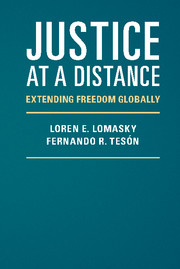1 - The State of the World
Published online by Cambridge University Press: 05 November 2015
Summary
THE JUSTICE QUESTION
What do we owe other people? An ancient answer is: their due. This is helpful only to the extent that it can be determined what that due may be. The simple answer advanced in this book is that what is primarily owed to others is to leave them aloneWe say “primarily” because requirements of justice extend in addition to particular performances owed to particular others. For example, to one's children, business partners, clients, students, friends, and lovers, one bears responsibilities that do not extend to people in general.
Exceptional circumstances engender obligations to anonymous others that also go well beyond noninterference. Following an example offered by Peter Singer, suppose that while treating yourself to a recreational walk, you encounter a young child face down in a puddle. You can easily wade in to pull her out; otherwise, she will drown. What should you do? We trust that our readers will not find this an especially challenging dilemma. Not to rescue the child would be wrong; more specifically, it would be to wrong the childYou owe her more than merely leaving her alone, even if the cost to you of rescue is wet toes and ruined shoes. Who would demur from saving a life at so minimal a cost? According to Singer, nearly all of us do. Around the world, there are tens of millions of children (and former children) who, in effect, are face down in smothering waters and cannot help themselves. These are the unfortunate others who live on the edge of exigence, where the absence of food or shelter or health care imperils survival. Minimal aid expenditures by those of us who are comparatively wealthy, alleges Singer, could extricate these people from their various puddles. Yet, for the most part, they are left to drown.
This sort of challenge inclines many theorists to think about the demands of justice as requirements to do something to ease the plight of the less well-off. Because well-being levels differ profoundly across borders, the urgency of aid provision will seem most acute in the domain of global justice. Succeeding pages examine various global-justice theories that take up this strategy. We begin, though, by announcing that this presumption is precisely to misconstrue the issues at stake.
- Type
- Chapter
- Information
- Justice at a DistanceExtending Freedom Globally, pp. 1 - 30Publisher: Cambridge University PressPrint publication year: 2015
- 1
- Cited by



